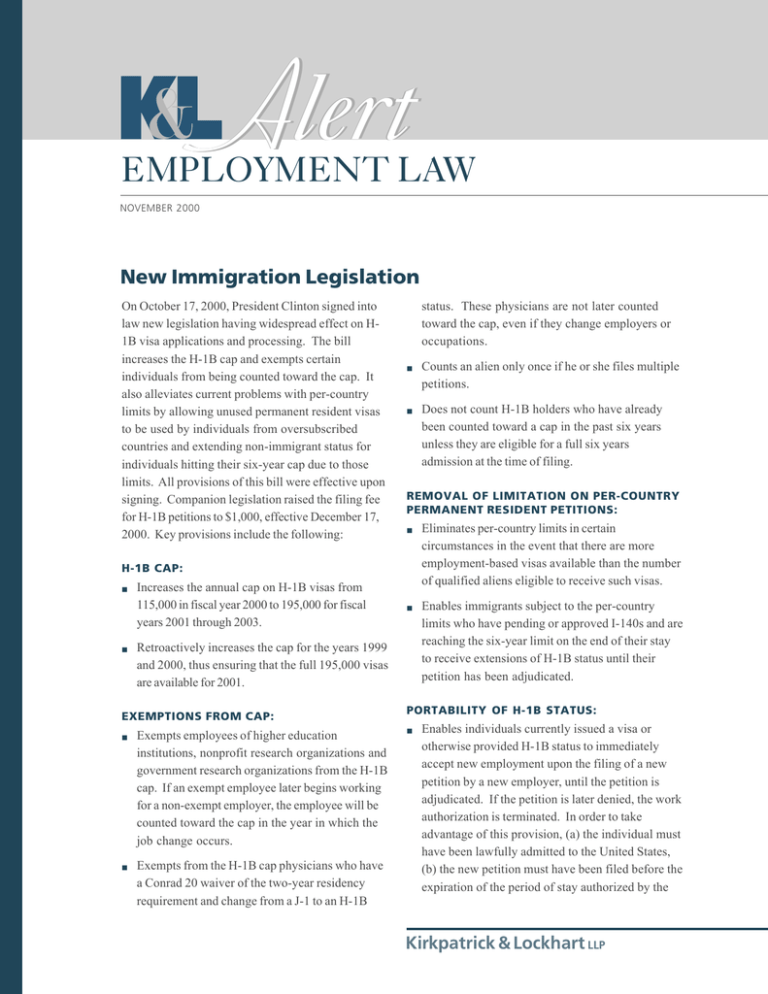
A lert
EMPLOYMENT LAW
NOVEMBER 2000
New Immigration Legislation
On October 17, 2000, President Clinton signed into
law new legislation having widespread effect on H1B visa applications and processing. The bill
increases the H-1B cap and exempts certain
individuals from being counted toward the cap. It
also alleviates current problems with per-country
limits by allowing unused permanent resident visas
to be used by individuals from oversubscribed
countries and extending non-immigrant status for
individuals hitting their six-year cap due to those
limits. All provisions of this bill were effective upon
signing. Companion legislation raised the filing fee
for H-1B petitions to $1,000, effective December 17,
2000. Key provisions include the following:
status. These physicians are not later counted
toward the cap, even if they change employers or
occupations.
■
■
■
Increases the annual cap on H-1B visas from
115,000 in fiscal year 2000 to 195,000 for fiscal
years 2001 through 2003.
■
■
■
■
Retroactively increases the cap for the years 1999
and 2000, thus ensuring that the full 195,000 visas
are available for 2001.
EXEMPTIONS FROM CAP:
Exempts employees of higher education
institutions, nonprofit research organizations and
government research organizations from the H-1B
cap. If an exempt employee later begins working
for a non-exempt employer, the employee will be
counted toward the cap in the year in which the
job change occurs.
Exempts from the H-1B cap physicians who have
a Conrad 20 waiver of the two-year residency
requirement and change from a J-1 to an H-1B
Does not count H-1B holders who have already
been counted toward a cap in the past six years
unless they are eligible for a full six years
admission at the time of filing.
REMOVAL OF LIMITATION ON PER-COUNTRY
PERMANENT RESIDENT PETITIONS:
H-1B CAP:
■
Counts an alien only once if he or she files multiple
petitions.
Eliminates per-country limits in certain
circumstances in the event that there are more
employment-based visas available than the number
of qualified aliens eligible to receive such visas.
Enables immigrants subject to the per-country
limits who have pending or approved I-140s and are
reaching the six-year limit on the end of their stay
to receive extensions of H-1B status until their
petition has been adjudicated.
PORTABILITY OF H-1B STATUS:
■
Enables individuals currently issued a visa or
otherwise provided H-1B status to immediately
accept new employment upon the filing of a new
petition by a new employer, until the petition is
adjudicated. If the petition is later denied, the work
authorization is terminated. In order to take
advantage of this provision, (a) the individual must
have been lawfully admitted to the United States,
(b) the new petition must have been filed before the
expiration of the period of stay authorized by the
Kirkpatrick & Lockhart LLP
Attorney General, and (c) the individual must not
have been previously employed without
authorization. The inclusion of this provision will
alleviate problems experienced by both H-1B nonimmigrants and employers due to delays in INS
processing of change of employer petitions, by
allowing beneficiaries to change jobs immediately.
Moreover, it could result in reinstatement for some
individuals whose H-1B petitions were denied
based on working too soon for a new employer,
because it is effective for petitions filed on,
before, or after the date of enactment of the
legislation.
■
IMPROVED SERVICES:
■
■
LENGTHY ADJUDICATIONS:
■
■
■
Requires the INS to change its practice so that
any H-1Bs revoked because of fraud or willful
misrepresentation will be added to the cap in the
year in which the petition was revoked.
Allows aliens who have been waiting one year or
more for a pending I-140 or labor certification to
extend their H-1B past the six-year limit. These
extensions are for one-year increments.
States a sense of Congress that the processing of
any immigration benefit should take no longer
than 180 days, except that employment-based,
non-immigrant petitions should take no more than
30 days.
Directs the Attorney General to take steps
necessary to reduce the backlog within one year,
grants additional funding, and requires reports on
the progress to eliminate the backlog.
FEE INCREASE (HR 5362):
■
Allows aliens whose I-485s have been pending for
180 days or more to change jobs or employers and
use the underlying petition or labor certification
for the new job, provided the new job is in the
same or similar occupational classification.
Increases the fee charged to employers who are
petitioners for the employment of H-1B nonimmigrant workers from $500 to $1,000, effective
December 17, 2000.
HAYES C. STOVER
412.355.6476
hstover@kl.com
Creates a bank wherein unused employmentbased visas from 1999 or 2000 can be held for
future use.
MEGAN M. CARPENTER
412.355.6540
mcarpenter@kl.com
Kirkpatrick & Lockhart LLP
Challenge us.
BOSTON
■
HARRISBURG
■
LOS ANGELES
■
MIAMI
■
NEWARK
■
NEW YORK
■
PITTSBURGH
■
SAN FRANCISCO
■
WASHINGTON
.........................................................................................................................................................
This publication/newsletter is for informational purposes and does not contain or convey legal advice. The information herein
should not be used or relied upon in regard to any particular facts or circumstances without first consulting with a lawyer.
© 2000 KIRKPATRICK & LOCKHART LLP.
ALL RIGHTS RESERVED.
